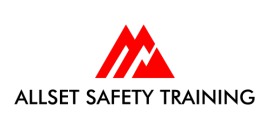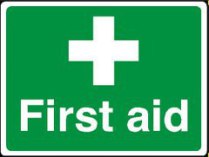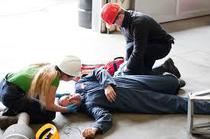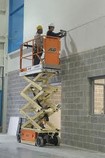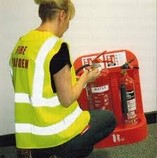Adobe Acrobat document [518.1 KB]
Adobe Acrobat document [86.4 KB]
News
We now deliver first aid training
Allset safety training are proud to have teamed up with a very energetic, knowledegable and enthusiastic trainer to be able to deliver a range of First Aid at Work Courses.
We currently are only offering the Emergency First Aid at Work Course, however look to being able to delivering a range of First Aid Training to meet your specific or legislative requirements.
Changes to CSCS Green Card (Labourer Card)
The Construction Skills Certification Scheme (CSCS) is making changes for obtaining a Green Card (Labourer Card). These new requirements being introduced from July 2014 state that along with the CITB Health, Safety and Environment (HS&E) Test, a qualification (or alternative) must be achieved in order to apply for the Green Card.
This qualification can be the CITB CSkills Site Safety Plus 1 Day Health and Safety Awareness Course.
This is a course that we deliver regularly. Click here for more information.
Contact Details
Allset Safety Training Ltd
Innovation Centre Medway
Maidstone Road
Chatham
KENT ME5 9FD
Mob: 07875 427330 (Jamie)
07791 378481 (Louise)
E-mail: jamie@allsetsafetytraining.co.uk
louise@allsetsafetytraining.co.uk
Please also use our contact form.
Get Social With Us
We are now on Facebook, LinkedIn and Twitter!!
Specific Health and Safety Courses
Emergency First Aid at Work Course (1 day): £120.00 per delegate
This 6hr (1 day) course, covers the syllabus as recommended by the Health & Safety Executive (HSE) for Emergency First Aiders in the workplace.
Designed for organisations that do not require a qualified First Aider at Work due to their size or nature of work. The HSE recommends that these organisations have a nominated person for the purposes of manging first aid equipment and taking charge when someone is injured or falls ill.
Who should attend this course?
The course is suitable for personnel from smaller low risk companies or larger companies with smaller multiple
offices.
Course Content:
Basic Life Support (CPR)
Treatment of an unconscious casualty
Incident, accident and casualty management
Primary and Secondary surveys
Shock, Controlling bleeds
Common work place injuries
Fractures and Burns
Common Illnesses
Please contact us for more information, course dates or to make a booking.
Working at Height Awareness Course (1/2 Day) £60.00 per delegate
This course is designed to give workers an appropriate knowledge of the risks surrounding working at height, an overview of the work at height equipment that can be used and information on how to carry out a risk assessment and ensure compliance with the Work at Height Regulations 2005
Who should attend this course?
Anyone who works at height in any place, including a place at or below ground level, is required to undertake sufficient training to prove that they are competent to work at height safely.
It is the employer's duty to ensure that adequate training is provided: Regulation 5 of the Work at Height Regulations 2005 states that employers must ensure all employees engaged in any work at height activity must be competent to do so. This includes, but is not limited to, professions such as:
- Roof workers
- Carpenters
- Bricklayers
- Tower climbing
- Solar panel and glass/glazing installation
- Telecommunications maintenance
- Window cleaning
- Gutter cleaning
- Putting up displays
- Excavating
- Shelf stacking
- Unloading and loading a vehicle
- Machine maintenance
The Work at Height Regulations 2005 specifies minimum safety and health requirements for the use of equipment for work at height.
The main duties under the Work at Height Regulations 2005 are:
- All work at height is to be properly planned and organised.
- The risks of working at height must be assessed to ensure appropriate work equipment is selected and used.
- Employers must ensure that all their workers are trained and competent before beginning any work at height and safe systems of work must be in place.
- Employees must follow any safety training and instructions given to them.
Please contact us for more information, course dates and to make a booking.
Construction Safety Awareness Course (1 Day): £130.00 per delegate
Who should attend?
This training course is suitable for all building and construction workers.
By the end of the course all delegates should be able to recognise their health and safety responsibilities and operate safely on a Construction site.
The course content includes, but is not limited to:
- General Responsibilities & Health and Safety Law
- Accident Prevention and Reporting
- Health & Welfare
- Manual Handling
- Working at Height
- Personal Protective Equipment (PPE)
- Emergency Procedures and First Aid
- Safe Use of Hazardous Substances
- Electrical Safety
- Hand-held Equipment and Tools
- Fire Prevention and Control
- Safety Signs and Signals
- Site Transport Safety
- Noise and Vibration
- Excavations and Confined Spaces
Construction accounts for more deaths than any other industry in the UK. The construction industry employs 2.2 million people and in the last 25 years, over 2,800 people have died from injuries they received as a result of construction work, with many more injured.
The aim of this course is to give construction workers an awareness of how to work safely and reduce the number of deaths and injuries within the industry and therefore reduce lost working time, thus increasing a company's profitability.
Please contact us for more information, course dates and to make a booking.
Manual Handling Awareness Course (1/2 Day): £60.00 per delegate
Manual handling involves the lifting or moving of loads which could potentially cause injury to a person's back or to their muscles, tendons, ligaments, nerves, blood vessels etc.
As well as short term injuries, incorrect manual handling techniques performed over the long-term can lead to chronic and painful injuries.
Our Manual Handling course is aimed at anyone who undertakes manual handling as part of their work duties. It gives delegates an understanding of safe manual handling, and is based upon the principles of safe moving and handling of loads known as the 'kinetic' approach to manual handling, and will involve a number of practical demonstrations and activities.
Objectives
On completion of the course delegates should be able to:
- Identify associated hazards before and during the handling of materials
- Identify the associated risks
- Identify and use required PPE correctly
- Carry out assessment of items to be handled and associated risks
- Carry out correct lifting techniques
- Identify alternative handling methods
Course Content
- Definition of Manual Handling
- The spine
- Manual Handling Operations Regulations and Obligations
- Identification of hazards
- Reducing the risks
- Management responsibilities
- Employee responsibilities
- Lifting equipment
- Lifting methods
Please contact us for more information, course dates and to make a booking.
Abrasive Wheel Awareness Course (1/2 Day): £60.00 per delegate
This course is designed to help delegates understand their responsibilities within the workplace and is aimed at persons working with Abrasive
Wheels.
It is a legal requirement under The Provision and use of Work Equipment 1998 (PUWER) that all staff who use abrasive wheels receive abrasive wheels training in the safe use of the tools and changing of wheels.
Objectives
By the end of the course delegates will have an understanding of current legislation and be able to demonstrate the safe fitting and use of abrasive wheels as per manufacturer's
instructions.
Course Content
- Definition of an Abrasive Wheel
- Relevant Legislation
- Abrasive Wheel Health and Safety
- Personal Protective Equipment
- Eye Protection
- Protection of Others
- Hand-Arm Vibration
- Safe use
- Inspection of Machines
- Wheel Selection
- Wheel Mounting
- Wheel Dressing
- Wheel Guarding
Please contact us for more information, course dates and to make a booking.
Fire Marshal Course (1/2 Day): £60.00 per delegate
This course is designed to teach delegates the role of the designated fire marshal. It also gives them the opportunity to learn about the different types of fire extinguisher and how to use them correctly.
Who should attend?
This course is suitable for those who are responsible for overseeing fire safety, designated fire marshals and anyone who needs to know how to use a fire extinguisher.
The course will present an insight into fire regulations and general fire precautions. It aims to provide delegates with the knowledge to be become a fire marshal.
Course content
- The role of the fire marshal
- Liaison with the fire service
- Action on discovering a fire
- Fire safety legislation
- The chemistry of fire
- Common causes of fire
- Fire safety precautions
- Fire drills and evacuation
- How to use fire extinguishers.
Writing Effective Risk Assessments and Method Statements (1 Day): £130.00 per delegate
Who should attend?
The course is designed to provide Contractors, Site Managers, Supervisors, Engineers,
Client's Representatives, Premises Managers and any other personnel who have to write or review health and safety method statements as part of their role with a comprehensive understanding
of the standards of method statements which should be produced.
Course Content:
- Introduction and setting course objectives
- Legal liabilities and relevant health and safety legislation.
- The legal powers available to the HSE in the enforcement of Contractors to produce suitable and sufficient risk assessments & method statements (RAMS)
- The role of RAMS in contract health and safety planning.
- The requirement for Principal Contractors, Site Managers, Clients and CDM Coordinators to properly review RAMS.
- Competence of those devising risk assessments.
- Understanding hazards and risks and the difference between them.
- HSE's "Five Steps to Risk Assessment".
- Devising suitable control measures to reduce the risk to an acceptable level.
- Effective use of generic method statements.
- Making generic method statements site specific.
- Use of regulations and industry guidance as a basis in the production of RAMS.
- Sources of information.
- Quantified and qualitative risk assessments
- Linking RAMS to "reasonably practical" judgements.
- Conveying the Message - level of information to be passed to the personnel at risk.
- Recording the receipt of information.
- Classroom based exercises.
Please contact us for more information, course dates and to make a booking.

